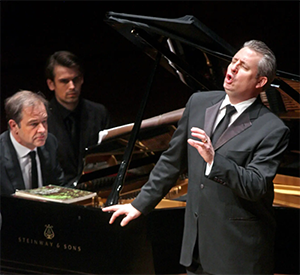by Kevin McLaughlin

It was this sort of unaffected honesty that Polenzani brought to the Cleveland Chamber Music Society at Disciples Christian Church on Tuesday, April 9, in a recital program of Schubert, Schumann, Finzi, and Ives. Out of keeping with the series’ regular fare of string quartets and instrumental chamber music, the freshness was doubly felt.
Perhaps past his boyish period — Polenzani is fifty-something now, with the experience of 300-plus Met roles under his belt — he still seems a young man in performance. There is a reservoir of sweetness and ease in him. Like a Schubert protagonist who sets out across his field full of confidence, optimism, and hope, right away he makes you feel hopeful too.
Even his soft-spoken announcing — a change in program order (Schubert first, not Schumann) and remarks about “the difficulty of Hardy’s poetry upon American ears” (Finzi songs) — was endearing, though inadvertently also left us with a false sense of insecurity. Then came the singing, and there was no further cause to doubt.
So much seems within reach for a voice like this — lithe and lyrical but showing shocking reaches of projection — that pigeon-holing fails with every attempt. Is he an Irish tenor? An ideal Tamino? A dream Nemorino? The answer to all is yes. And, if he wanted, Don José too.
Obvious comfort level in every language is part of the categorizer’s problem. His German diction was “Wunderlich” (sorry), at least to this erstwhile German speaker’s ears, even in the trickier Karl Lappe lines, like “Trinkt noch Gluth und schlürft noch Licht,” sung at a near whisper in Schubert’s Im Abendrot. His English too, notoriously difficult to sing well, was crystal clear, and his Italian, which we got to hear in the two encores, was suave and undoubtable.
He was joined by the impeccable English pianist Julius Drake, who brings, if not benevolent schoolmasterliness exactly, a sober foil to Polenzani’s youthful exuberance. He spoke up, for example, on behalf of Thomas Hardy when Polenzani seemed to be prepping the audience for a difficult time with the texts to A Young Man’s Exhortation (“It’s beautiful poetry!” Drake protested). His piano playing was as untroubled and virtuosic as Polenzani’s singing, with an impeccable sense of timing between Schubert stanzas and in the piano post-commentaries of the Schumann songs.
The program was symmetrical, with a pair of German and English language groupings on either side of the intermission: Schubert-Finzi, Schumann-Ives.
The five Schubert songs spoke of a young man’s springtime yearnings gone by. Drake and Polenzani wrung the most out of the protagonist’s downward emotional trajectory, starting at hope (“Frülingsglaube” and “Im Früling”), through ingenuousness (“Der Einsame”), melancholy (“Ständchen”), and finally transcendence (“Im Abendrot”). Both performers used pacing between stanzas extremely effectively — particularly in “Ständchen,” where new realms of despair, rendered from so familiar and “gemütlich” a melody, began to dawn by the final verse. The final slide from major to minor by Drake in this song’s piano post-mortem felt like a dagger to the heart.
Finzi’s A Young Man’s Exhortation, Op. 14 — sung not nearly enough on this side of the Atlantic — was an unsuspected trove of loveliness. It displayed Polenzani’s voice at its freshest, and his legato at its smoothest. Despite the singer’s misgivings, I found Hardy’s words a satisfying meld with Finzi’s folk-tinged music. Especially so the memory of young love in “The Sigh.”
Afterwards I knew her thoroughly,
And she loved me staunchly, truly,
Till she died; But she never made confession
Why, at that first sweet concession,
She had sighed…
The result was some of the most beautiful lyrical writing — and singing — of the evening, and maybe the handiest use of the upper register to underline key words.
After intermission came the nine songs of Liederkreis, Op. 24, one of Schumann’s five song cycles written during the young composer’s fabled “Liederjahr” (year of song) of 1840, while he was besotted with his new wife, Clara. Polenzani brought his full range of vocal gifts here: a generally light timbre flexing between startling strength and gentle pianissimos, motored by a sure rhythmic sense, particularly appreciated in the rocking motions of “Warte, warte, wilder Schiffman” (“Wait, wait, wild boatman”). Not to mention a sense of pacing and psychic empathy — the lovesick protagonist’s wishful thinking, for example, in “Schöne Wiege meiner Leiden (“Pretty cradle of my sorrows”).
The five selections of Charles Ives, taken from his 114 Songs and published in 1922, reveal the composer’s understanding of the Lied tradition and his ingenious powers for vivifying text. By turns touching, wistful, and lightly humorous, the songs have a plainspoken, homey quality and a way of tugging at the heart. Here Drake was a particularly effective partner, shading his piano timbre to fit or magnify the singer’s.
Not inclined to let the pair leave so soon, sustained applause and whoops from the audience yielded first one, then two encores: Francesco Paolo Tosti’s Marechiare and Reynaldo Hahn’s La Barcheta, the latter prefaced by Drake asking our permission to allow Polenzani, whose memory “has been so reliable all night,” to rely on printed words for just this one song. “He sings it better than anyone in the world,” Drake said, “but the last time we did it was a few months ago.” It was one final humble act — we allowed it and were glad.
Published on ClevelandClassical.com April 17, 2024.
Click here for a printable copy of this article



